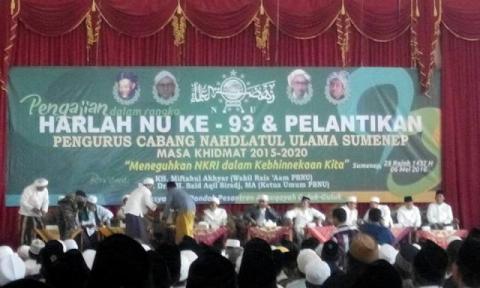Sumenep, NU Online
A wide range of Wahhabi and radical movements have emerged and remained growing in the midst NU followers (Nahdliyin). Therefore, there needs to be a redesign of how to reorient the Nahdlatul Ulama (NU) as a religious social organization (jam'iyyah diniyyah ijtimaiyyah).
General Chairman of NU KH Said Aqil Siradj, popularly known as Kang Said, made the remarks at an oration on nationality and the inauguration of the Sumenep NU board members in the Syarqawi Hall, Pesantren Annuqayah, Guluk-Guluk, Sumenep, East Java, on Friday (6/5).
Kang Said called the importance of NU circles to take strategic measures in propagating the teachings of Ahlussunnah wal jamaah having so far been maiantained and preserved by the Indonesia's largest muslim organization.
Now many go in groups not Aswaja in various lines, especially in educational institutions and government.
"In addition, NU must be such a grand control. Now there are village funds. NU ranging from the village to the central level need to be coordinated to maintain the village funds," he said, adding that the Nahdliyin should be careful and aware of any possible misleading sect spreading in all sectors of life.
"NU is the largest organization in the world even in Hereafter, because people who died did not mean uprooted their (NU) membership. Therefore, they have still been sent by prayers and tahlil," the full audience then burst into applause and laughter over his statement.
The inauguration was attended by thousands of Nahdliyin, senior leaders of Annuqayah, clerics, regent of Sumenep KH A Busyro Karim, Chairman of Ansor Sumenep M Muhri Zaen, and all autonomous bodies under the auspices of the Sumenep chapter of NU.
Chairman of NU Sumenep KH A Panji Taufiq along with other board members were sworn-in by the Deputy General Chairman of the Advisory Board (Rois' Aam) of NU East Java KH. Miftahul Akhyar. (Masdar)
Terpopuler
1
Khutbah Jumat: Ramadhan, Melatih Sabar, Memperkuat Syukur
2
Gerhana Bulan Total Bakal Terlihat di Seluruh Indonesia pada Selasa 3 Maret 2026, Dianjurkan Shalat Khusuf
3
Khutbah Jumat: Tiga Kebahagiaan Orang Puasa
4
Gus Yahya Sebut Kepergian Ketum Fatayat Margaret adalah Kehilangan Besar bagi Keluarga NU
5
Ali Khamenei Wafat dalam Serangan Israel-Amerika
6
Khutbah Jumat: 4 Cara Menghidupkan Malam Ramadhan dengan Ibadah
Terkini
Lihat Semua
















